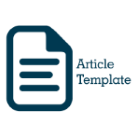UNDERSTANDING THE INTENTION TO ENGAGE IN ACADEMIC DISHONESTY AMONG PRIVATE TERTIARY INSTITUTION UNDERGRADUATES IN MELAKA, MALAYSIA
Abstract
Academic dishonesty represents a severe threat to institution’s integrity by contradicting the principles and values of students. It appears to be related to attitudes toward unethical behaviours in the workplace too. The purpose of this study is to determine the contributing factors towards the intention to engage in academic dishonesty among undergraduates in two private tertiary institutions in Melaka, Malaysia namely Universiti Multimedia and Kolej Universiti Islam Melaka. The research instrument was a survey questionnaire consisting of questions, adapted from Beck and Azjen (1991) which comprised five (5) components of modified theory of planned behaviours; intention to perform academic misconduct, attitude towards cheating, subjective norms, perceived behavioural control, and perceived locus of control. The findings revealed two factors with a significant influence towards academic dishonesty: moral obligation and attitude towards cheating. Meanwhile, subjective norms, perceived behavioral control and perceived locus of control were deemed not significant in relation towards academic dishonesty among the students. These results suggest that students need to be educated about their roles in supporting academic dishonesty; the policies and the consequences of misdemeanors. The institutions also need to be well-informed about the importance of consistency in addressing the issues in academic dishonesty.
Keywords
academic dishonesty; academic integrity; theory of planned behavior
Full Text:
PDFCopyright (c) 2020 Jurnal ILMI
This is an Open Access article distributed under the terms of the Creative Commons Attribution-NonCommercial-NoDerivatives 4.0 International (CC BY-NC-ND 4.0), permitting copy and redistribute the material in any medium or format.


